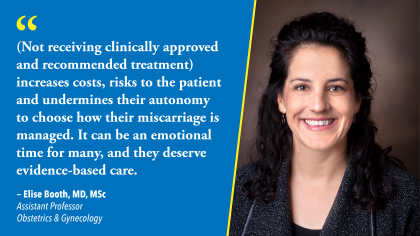A new study published in the Journal of the American Medical Association by researchers at Vanderbilt University Medical Center has found that the recommended two-medication regimen, mifepristone plus misoprostol (similar to that used for induced medication abortion) remains significantly underused despite recommendations to do so from medical professionals and major medical societies.
Mifepristone was approved by the Food and Drug Administration in 2000 but remains subject to prescribing restrictions, which has limited its availability.
The use of both mifepristone and misoprostol together to medically manage first trimester miscarriage was recommended by the American College of Obstetricians and Gynecologists in November 2018. ACOG approved the medication combination in light of research demonstrating the use of mifepristone and misoprostol together was safe, more effective and cost-effective compared to using misoprostol alone.
Vanderbilt researchers have found among all states, 0.4% of women treated for miscarriage in 2016 received the two-medication regimen, which increased to only 2.5% in 2020 despite society guidelines.

“Clinicians continue to exclusively prescribe misoprostol alone despite the evidence that combination treatment of mifepristone plus misoprostol is both more effective and cost-effective,” Leech said.
The study used anonymous commercial insurance claims data from January 2016 to November 2020 to compare prescription rates among more than 22,000 women before and after the official recommendation from ACOG. Since some data might not be observed in states with restrictions on abortion care, the study separately looked at rates of medication use for miscarriage both overall and excluding states with abortion care restrictions on fully insured private plans.
In states without restrictions on insurance coverage on abortion care there was minimal variation in the findings, researchers noted. In unrestricted states, just 0.51% of women received both medications in 2016 and 3.08% in 2020.
“The politicization of mifepristone and its prescribing restrictions disincentivizes clinicians from using the most effective regimen to treat patients experiencing miscarriage who desire medical management,” said Elise Boos, MD, assistant professor of Obstetrics and Gynecology at VUMC, and lead author of the study. “Unfortunately, availability issues surrounding mifepristone could potentially worsen due to the growing divide in reproductive health care in the U.S.”
Boos said when women experiencing miscarriages do not receive the most effective regimens for management, they may need additional visits or undesired surgical procedures to remove the pregnancy tissue.
“This increases costs, risks to the patient and undermines their autonomy to choose how their miscarriage is managed. It can be an emotional time for many, and they deserve evidence-based care. Eliminating the politicization of mifepristone will ensure safe miscarriage management.”
The study was funded by grants from the National Institute on Drug Abuse and Vanderbilt University Medical Center.